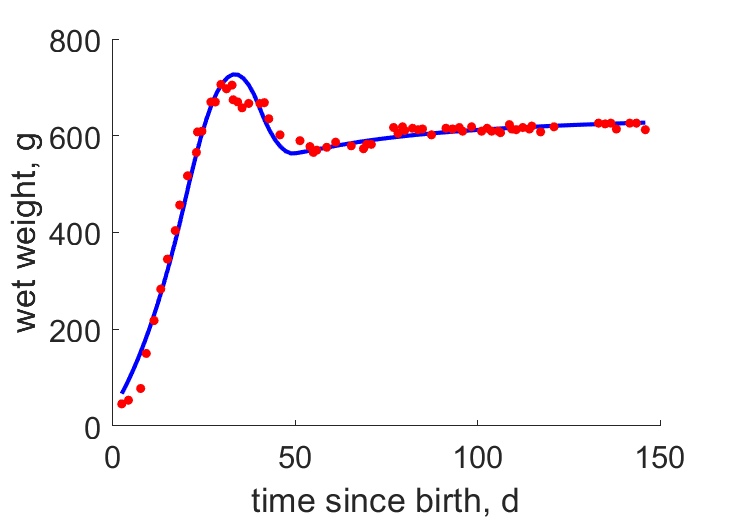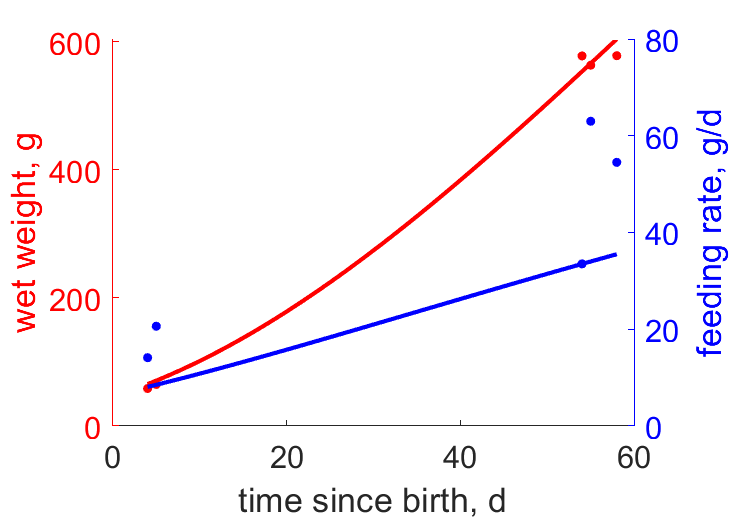Predictions & Data for this entry
| Model: std | climate: A, BWh, BSh, Cwa, Cwb | migrate: | phylum: |
| COMPLETE = 2.7 | ecozone: TPa | food: biCi, biCv | class: |
| MRE = 0.049 | habitat: 0iTh, 0iTg, 0iTa | gender: Dg | order: |
| SMSE = 0.022 | embryo: Tnpf | reprod: O | family: |
Zero-variate data
| Data | Observed | Predicted | (RE) | Unit | Description | Reference |
|---|---|---|---|---|---|---|
| ab | 32.75 | 33.59 | (0.02563) | d | age at birth | avibase |
| tx | 41 | 40.67 | (0.008087) | d | time since birth at fledging | avibase |
| tp | 123 | 125 | (0.01611) | d | time since birth at puberty | guess |
| tR | 730 | 730 | ( 0) | d | time since birth at 1st brood | avibase |
| am | 8760 | 8751 | (0.0009974) | d | life span | guess |
| Ww0 | 48 | 45.42 | (0.0538) | g | initial wet weight | avibase |
| Wwb | 31 | 34.07 | (0.099) | g | wet weight at birth | guess |
| Wwi | 740.5 | 725.7 | (0.01998) | g | ultimate wet weight for female | avibase |
| Wwim | 510.5 | 513.3 | (0.005566) | g | ultimate wet weight for male | avibase |
| Ri | 0.01027 | 0.01041 | (0.01309) | #/d | maximum reprod rate | avibase |
Uni- and bivariate data
| Data | Figure | Independent variable | Dependent variable | (RE) | Reference |
|---|---|---|---|---|---|
| tW |  | time since birth | wet weight | (0.02599) | Kemp1975 |
| tWJX |  | time since birth | wet weight feeding rate | (0.1962) | Kemp1975 |
Pseudo-data at Tref = 20°C
| Data | Generalised animal | Falco biarmicus | Unit | Description |
|---|---|---|---|---|
| v | 0.02 | 0.03081 | cm/d | energy conductance |
| p_M | 18 | 383.9 | J/d.cm^3 | vol-spec som maint |
| k_J | 0.002 | 0.01604 | 1/d | maturity maint rate coefficient |
| k | 0.3 | 0.3057 | - | maintenance ratio |
| kap | 0.8 | 0.9483 | - | allocation fraction to soma |
| kap_G | 0.8 | 0.8009 | - | growth efficiency |
| kap_R | 0.95 | 0.95 | - | reproduction efficiency |
Discussion
- Males are assumed to differ from females by {p_Am} only
- Scaled functional response varies in time
- mod_1: v is reduced
- mod_2: Pseudo-data point k is used, rather than k_J; Data set tp and parameter t_R are added, the latter replacing clutch interval t_N. Postnatal T is based on PrinPres1991, see get_T_Aves. See further the revision page, theme puberty
Bibliography